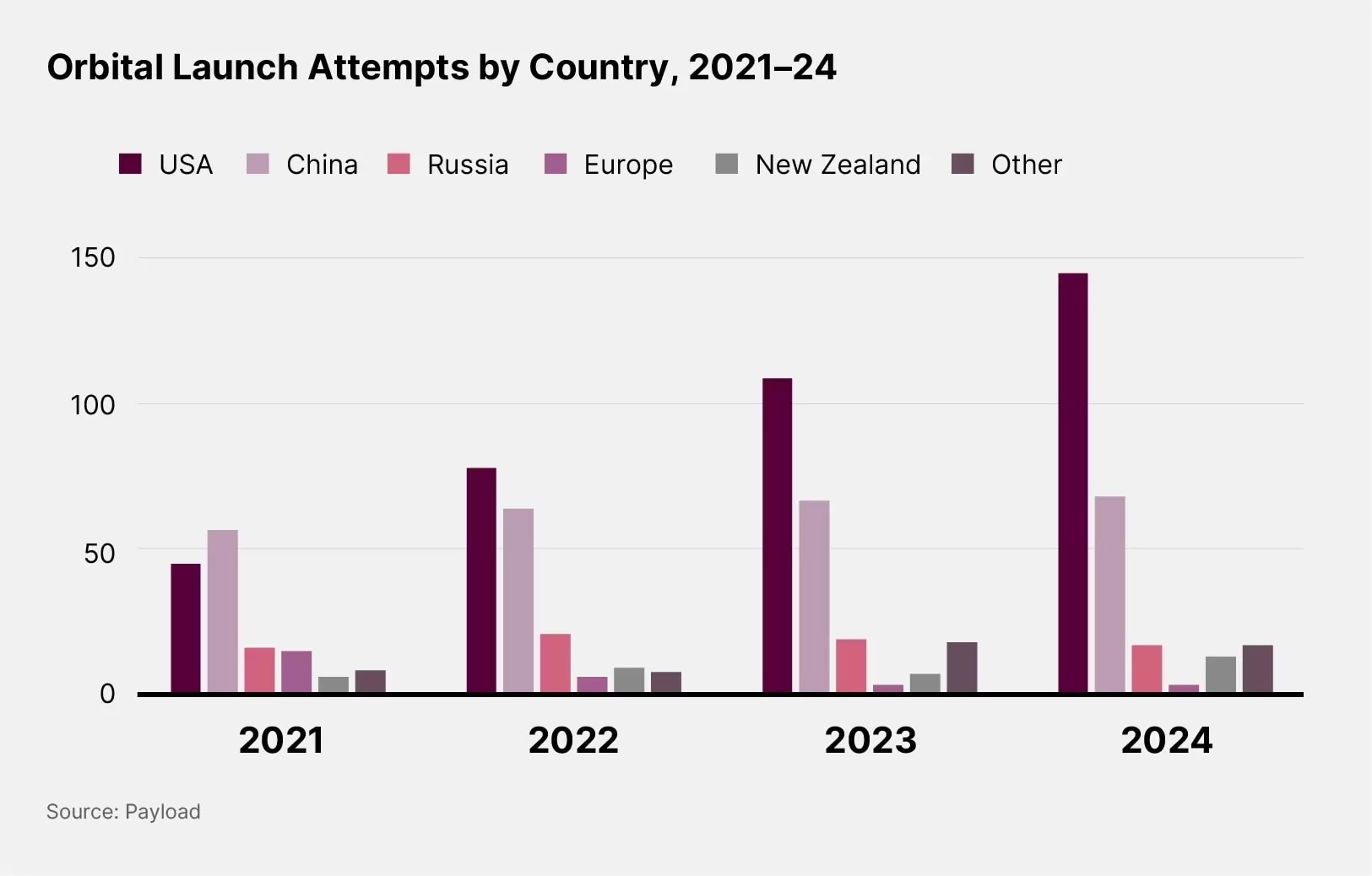We are living in a second space age.
2024 saw a record 263 rocket launches conducted globally — compared to 141 in 1967, the record prior to 2020.
However, this second space age differs from the first in a few key respects. Crucially, more countries are attempting launches, with China, the EU, Japan and India making advances alongside the US and Russia.
Moreover, this space renaissance has been led by private companies: in 2024, commercial launches accounted for 70% of global attempts.

As Rocket Lab [RKLB] CEO Peter Beck explains, changes in US space and defense regulation have opened the market to a wider range of players. These new opportunities were “created to leverage all of the commercial opportunities that are coming to market. It doesn’t require those big-asset investments, but nevertheless enables people like us to compete for these missions on a standalone basis.”
Build It and They Will Come
Operating as a commercial player in a field that was, until recently, dominated by public entities has its particularities.
Due in part to scale, space companies deal with a different narrative of growth than most commercial ventures, Beck explains. “We’re chasing very large, billion or multi-billion dollar opportunities. So that does make the backlog growth a little bit lumpy.”
For a company with the capabilities of Rocket Lab, even a single project and a single major client can translate into a multi-billion-dollar opportunity down the line.
Beck mentions Neutron, a partially reusable rocket designed to help deploy satellite constellations or run cargo transport missions. The project has received regulatory approval and announced its first contract with the US Air Force in May 8, with launch scheduled for the second half of 2025.
Even if Neutron orders grow by one client a year, that translates into contracts “in the order of $50m–55m,” Beck points out. And most of Rocket Lab’s projects deal in this kind of scale. “We spend a lot of resource and a lot of time on these really large moving opportunities. We’ve grown to kind of a scale and a competency and capability that we can absorb one or two of these very large opportunities.”
Ultimately, growth will come in leaps and bounds, Beck says. “There are pretty significant opportunities to feed the machine.”
AI Efficiencies
While the synergies between artificial intelligence (AI) and space technology might sound glamorous, their applications tend to be quite straightforward. It is the results that are stellar.
“We have dedicated AI resources and we’re pushing that throughout the company,” Beck explains. “Some of the gains in efficiency are just phenomenal.”
While AI has a pretty established role in fields like Earth observation — where it is used to sort through massive pools of satellite imaging data — it also speeds up many of the coding processes essential to Rocket Lab’s operations. Beck cites a recent engine development push: “the entire user interface and GUI was all coded using AI in a day.”
For an AI-proponent like Beck, the proof is in the pudding. And when a process that would have taken a week or more is auto-coded in a day, that directly translates into time and money saved.
Plus, the benefits scale up with the work you do. “Little stuff like that doesn’t sound much, but you do that five times and you’ve got five weeks of savings.”
The Future of Commercial Space Firms
With the commercial space sector developing so fast, predicting its trajectory can feel like peering into the distant future.
“10 years is a long time,” Beck jokes. “Rocket Lab years are like dog years, right?”
According to Beck, the future for space companies looks a lot like Rocket Lab’s present: “If I’ve done my job right, my firm belief is that the large space companies of the future are going to look exactly like Rocket Lab. They’re going to have the ability to deploy infrastructure in orbit by building their own spacecraft. And they’re going to be able to launch it using their own rockets.”
Vertical integration is likely to blur the lines between various space-related services. Increasingly we will be asking the question, “is this a space company or is this a particular applications company?” However, Beck explains, “vertical integration, being able both to launch your own stuff and build your own stuff, is just so powerful that it will be the default successful business model for the really, really large space companies.”
“That’s where we’re aiming to be and, in 10 years’ time, I would expect that we will be there,” he adds. “Otherwise, fire me now.”
Watch the full episode on YouTube.
Continue reading for FREE
- Includes free newsletter updates, unsubscribe anytime. Privacy policy





